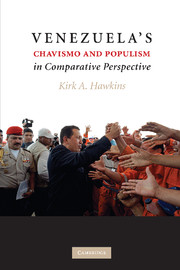Book contents
- Frontmatter
- Contents
- List of Tables
- Preface
- Acknowledgments
- 1 Introduction
- 2 Chavismo, Populism, and Democracy
- 3 Measuring the Populist Discourse of Chavismo
- 4 Party System Breakdown and the Rise of Chavismo
- 5 The Causes of Populism in Comparative Perspective
- 6 Populist Organization: The Bolivarian Circles in Venezuela
- 7 Populist Policy: The Missions of the Chávez Government
- 8 Conclusion
- Appendix A The Populist Speech Rubric
- Appendix B Test of the Sampling Technique
- Appendix C Test of Interaction Effects
- References
- Index
4 - Party System Breakdown and the Rise of Chavismo
Published online by Cambridge University Press: 17 May 2010
- Frontmatter
- Contents
- List of Tables
- Preface
- Acknowledgments
- 1 Introduction
- 2 Chavismo, Populism, and Democracy
- 3 Measuring the Populist Discourse of Chavismo
- 4 Party System Breakdown and the Rise of Chavismo
- 5 The Causes of Populism in Comparative Perspective
- 6 Populist Organization: The Bolivarian Circles in Venezuela
- 7 Populist Policy: The Missions of the Chávez Government
- 8 Conclusion
- Appendix A The Populist Speech Rubric
- Appendix B Test of the Sampling Technique
- Appendix C Test of Interaction Effects
- References
- Index
Summary
The rotten elites of the parties are boxed in, and soon they will be consigned to the trashbin of history.
Hugo Chávez, 1998 closing campaign speech[The constitution] must die, and with it the disastrous political system that it gave birth to during these past forty years.
Hugo Chávez, 1999 inaugural addressWhat causes populism? In the next two chapters I shift from describing Chavismo and populism to explaining their causes. By this, I mean not the existence of populism in the abstract, in the sense of providing some kind of intellectual history or a genealogy of ideas, but the more social scientific question of why large numbers of citizens, activists, and even elected officials would embrace a movement with a populist discourse. Because of the nature of the data at hand, I present the theory in two parts. In this chapter, I focus on the breakdown of Venezuela's traditional party system and the accompanying rise of populist movements, especially Chavismo. This gives us an opportunity to explore the demand side of populism and demonstrate that widespread corruption is probably the most important condition for the emergence of populist movements. Then, in the following chapter, I move beyond the case of Venezuela to consider Chavismo in a comparative cross-national context. That perspective gives us a better opportunity to test the interaction of corruption and policy crisis, and it lets us say more about the possible factors affecting the supply of populism in any country.
- Type
- Chapter
- Information
- Venezuela's Chavismo and Populism in Comparative Perspective , pp. 86 - 130Publisher: Cambridge University PressPrint publication year: 2010

